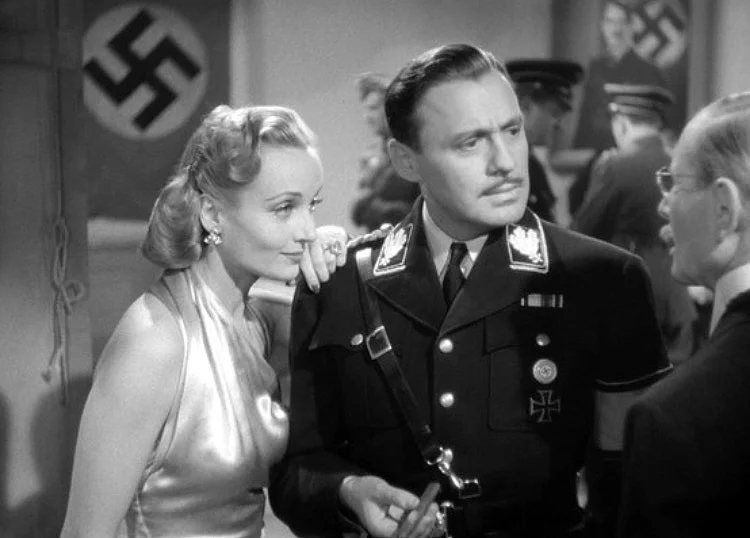The stage actor Joseph Tura, played to perfection by Jack Benny with his trademark silky hauteur, is the target of the most notorious gag in Ernst Lubitsch’s audacious comic masterpiece To Be or Not to Be (1942). The blustery Nazi colonel Ehrhardt (Sig Ruman, a standout among the great ensemble cast) recalls that he saw Tura on stage in Warsaw: “What he did to Shakespeare we are now doing to Poland.” Critics attacked the joke as callous. Even the sardonic Billy Wilder tried to convince Lubitsch to cut the line, afraid that it minimized Nazi atrocities. Of course, Lubitsch refused. Unabashed ridicule was his liberating weapon of choice in this perfect blend of comedy and tragedy.
When The New York Times critic Bosley Crowther called the film “a shocking confusion of realism and romance,” he admitted, “frankly, this corner is unable even remotely to comprehend the humor in such a juxtaposition of fancy and fact.” Lubitsch responded in a letter to the editor that “the American audience doesn’t laugh at those Nazis because they underestimate their menace, but they are happy to see this new order and its ideology being ridiculed.” Indeed, the screenplay is filled with startling and hilarious gags. In one scene, Tura is impersonating Colonel Ehrhardt, and in response to a comment about the concentration camps, he quips, “Yes, we do the concentrating and the Poles do the camping.” The success of Charlie Chaplin’s The Great Dictator (1940) may have emboldened Lubitsch, but he also may have been provoked to action by another 1940 film, the Nazi propaganda documentary The Eternal Jew, which includes footage of Lubitsch—a German Jew who left his country in the 1920s and achieved tremendous Hollywood success—depicting him as an archetypical grotesque Jew.
To Be or Not to Be is part of a bountiful series of films about theater selected by playwright (and now excellent film director) Annie Baker. Its satirical portrayal of Nazis aside, this is one of Hollywood’s most accurate and affectionately ribbing portrayals of the tensions and camaraderie inside a theater troupe. The real genius of the Lubitsch film is the way that it intermingles the two themes of theater and war. “What I have satirized in this picture are the Nazis and their ridiculous ideology. I have also satirized the attitude of actors who always remain actors regardless how dangerous the situation might be, which I believe is a true observation.”
A theater company in Nazi-occupied Warsaw, whose stars are the married couple Joseph and Maria Tuva (Carole Lombard, in her sharpest, most effervescent performance, which was also tragically her last) are rehearsing a new play, Gestapo, by day and performing Hamlet by night. It can be said that the film frequently shifts modes, from screwball-paced glossy comedy to wartime thriller, to noir-flavored espionage film, but it is more fitting to say that these layers coexist throughout the film at all times. The petty bickering, rivalries, camaraderie, distrust, and difficulty of putting aside personal ambition for the good of a group effort is on display throughout, whether with the theater company or with the gestapo. It is clear, of course, where Lubitsch’s sympathies lie, and ultimately the theater company triumphs, pulling off an act of espionage and deception that proves their greatest performance. And Hamlet’s famous soliloquy, which at first seems to be little more than a set-up for a running gag, becomes deeply meaningful, as the actors band together to “take arms against a sea of troubles, and by opposing, end them.” Released in the same year as Casablanca, To Be or Not to Be is ultimately a call for collective action and for the United States to rise above its petty self-absorption. Casablanca and To Be or Not to Be both hit theaters months after Pearl Harbor and both support the Allied cause. But the Lubitsch does so with many more jokes. And as one of the characters in the Lubitsch film says, “laughter is nothing to sneeze at.”
To Be or Not to Be screens this afternoon, June 16, at Film at Lincoln Center as part of the series “Angels and Puppets: The Stage on Screen with Annie Baker.”



